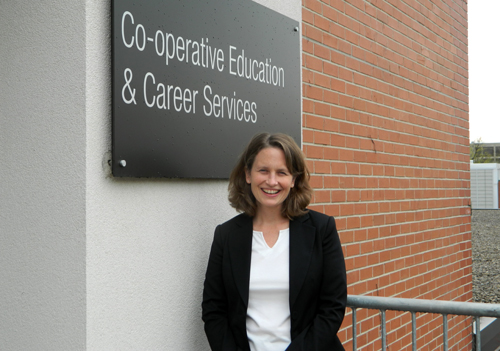
With 17 years as a corporate headhunter under her belt, Tammy Connelly certainly knows what employers are looking for. But as manager of Co-op and Employer Partnerships, she considers students and employers to be equally important stakeholders. Connelly and her team of 10 work hard to find the right match for both.
“Our mandate is to help students become employed, whether that is for a summer job, a co-op work term or a full-time position after graduation,” she says. “As part of that, our department helps prepare students if they need assistance with their job search, resume and cover letter writing or interviewing skills.”
She reminds students that many employers plan interviews and make hiring decisions in the fall about students they want to hire after graduation in April. “Often students starting their final year are solely focused on their classes and studying,” Connelly says. “However, they should also be making connections and starting the process of looking for work.”
Another part of her job is working with employers to help them see the added value that U of G students can bring to their companies. While some potential employers already have a Guelph connection and will call Connelly to discuss hiring, her team also spends time knocking on doors and making connections. “We’ll ask if they have thought about Guelph as a place to recruit and make sure they know about the range of programs available here,” she says, pointing out that many people don’t realize the University offers more than 90 majors and that 38 of them can have a co-op component.
At U of G, students can have a four-month, an eight-month or in a few programs a 12-month co-op term, giving employers more flexibility. “Often employers provide extensive training, so the longer employment options increase return on that investment,” says Connelly. For others, the four-month co-op term is a better fit.
And while most of the larger companies understand how co-op terms work, Connelly says some smaller ones don’t realize how different these are from a high school co-op placement. “In Ontario, employers can get a tax credit for hiring a university co-op student,” she says. Small companies are as welcome as larger ones; in fact, a number of entrepreneurial ventures have taken on co-op students. The students do well with these companies, often providing that critical early marketing, planning and design support a small business needs.
Connelly adds that her focus is long-term. “A company may not have any openings right now, but we still want to connect with them. Things can change.” Even if a company isn’t hiring, Connelly and her team look to find other ways to get them involved with the University: speaking to classes, engaging in case studies and design projects or perhaps judging at a Gryphon’s Den event.
Some of the “knocking on doors” her team does is far removed from the Guelph campus. Explains Connelly: “Many co-op students want their employment to be in Guelph or the GTA, but there are some great opportunities for those willing to relocate. And for some programs, the best options are a far distance from home.”
For example, 144 co-op students completed work terms outside Ontario in 2014. Of those, 74 were in western Canada. Connelly says U of G could easily have a few hundred students working in Alberta, Saskatchewan and British Columbia if more were interested in heading west.
One great example of students stepping out of their comfort zone, both from a location and working condition perspective, is an on-going co-op job opportunity with Environment Canada in Alert, Nunavut. Located 800 km south of the geographic North Pole, the job site is the most northern permanently inhabited station in the world.
Students working at the Global Atmosphere Watch Observatory must deal with isolation, fewer daylight hours and an independent work environment. Yet it is has been described by the environmental science and engineering co-op students who have worked there as an interesting and highly fulfilling work experience.
Encouraging students and graduates to think beyond traditional career paths associated with their major and to explore different industries and functions is a key message the co-op team reinforces. “Students and graduates need to understand that career paths are rarely linear, and employers aren’t expecting candidates to have every skill listed in their posting,” says Connelly. “Don’t screen yourself out of a job before you even apply. If the employer is posting the job on recruitguelph.ca they know that students and new graduates will apply.”
Employers, she adds, love Guelph students. “We get fantastic feedback from hiring managers. They say our students and grads are very collaborative and team-oriented. I think that’s partly the kind of students we attract, and that many courses taught here are collaborative and cross-disciplinary. Employers tell us they want more Guelph applicants because they like what they can do.”
Connelly, who grew up in Ontario, had been working in Alberta for eight years before she was hired at U of G. “It was a huge benefit to find such a connected and engaging community here,” she says. “The University of Guelph has a rich and diverse history and culture, and we see it in the way people react to our name when we are at trade shows or other events. We definitely punch above our weight – we have tremendous research going on here, prominent faculty and alumni working worldwide. Doors open when people hear ‘University of Guelph.’”